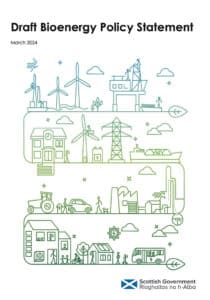In a bid to advance sustainable energy practices, the Scottish Government has unveiled a draft policy statement on bioenergy, inviting public input to shape future strategies.
 The policy outlines the government’s vision and objectives concerning the utilisation of bioenergy resources across various sectors and provides a comprehensive overview of the proposed policies and their potential impact on Scotland’s energy landscape.
The policy outlines the government’s vision and objectives concerning the utilisation of bioenergy resources across various sectors and provides a comprehensive overview of the proposed policies and their potential impact on Scotland’s energy landscape.
With the impacts of climate change becoming ever more acute, it is essential that ambitious targets to reduce greenhouse gas emissions to net zero by 2045 are met. The Scottish Government’s draft “Bioenergy Policy Statement” signals what the Scottish Government see as the short, medium and long-term role for bioenergy in helping to deliver that transition to Net Zero.
Bioenergy, derived from organic materials such as plants and animal waste, holds significant promise as a renewable energy source, offering opportunities for carbon reduction and fostering a transition towards a greener economy. Recognising its potential, the draft policy statement outlines measures to promote responsible bioenergy production and consumption while addressing environmental and societal considerations.
Bioenergy is already a key component of the energy system and contributes to a more circular economy, by turning waste into valuable resources which can be used for electricity and heat production, or to displace fossil fuels in gas network and transport systems. The bioenergy technologies described in the policy statement all require a sustainable supply of feedstock. Further development of a thriving and homegrown market for domestic production of bioenergy feedstock, such as perennial energy crops, could provide opportunities for rural communities whilst providing a secure and sustainable supply. Additionally, perennial energy crops, through strategic land management and integration, present a promising avenue for mitigating emissions and fostering ecological resilience.
Previous work by ClimateXChange suggests that Scotland could potentially accommodate around 90,000 hectares of Short Rotation Coppice and Short Rotation Forestry (SRF) by 2045. The consultation seeks responses to 11 questions of which 5 are specific to the involvement of biomass crops. These deal with the potential contribution to net zero targets and what encouragement is required for the upscale of growing and utilisation of biomass crops. The consultation also requests best practice examples of biomass crops being integrated into the landscape and agriculture sector and examples of bioenergy crops benefitting biodiversity.
As the Scottish Government seeks to shape its bioenergy policies for the future, it invites feedback from stakeholders, including industry representatives, environmental organisations, academia, and the general public. Interested parties are encouraged to review the draft policy statement available on the government’s website and submit their comments and suggestions.
Why your views matter
Consultation is an essential part of the policymaking process. It allows the Scottish government to consider your opinions and expertise on a proposed area of work.
The Scottish Government are seeking views on the priorities and principles for use of bioenergy that have been set out in the draft statement. They seek views on the resources which are available to the bioenergy sector and where they can best support Scotland’s journey towards Net Zero. This means that the use of bioresources needs to be prioritised to where they can be most effective in reducing emissions and where there is the greatest need for alternatives to fossil fuels.
They are also seeking views on the potential to scale up domestic biomass production by using perennial biomass crops. Scaling up our domestic biomass supply chain could provide security of supply, greater supply chain transparency and accuracy of lifecycle emissions calculations, as well as ensuring we do not have an overreliance on imported biomass.
Click on the link to start your Consultation.
Alternatively, you can email your views to this address [email protected]
The consultation is open now but the deadline for submitting feedback on the draft bioenergy policy statement is 12th June 2024.



